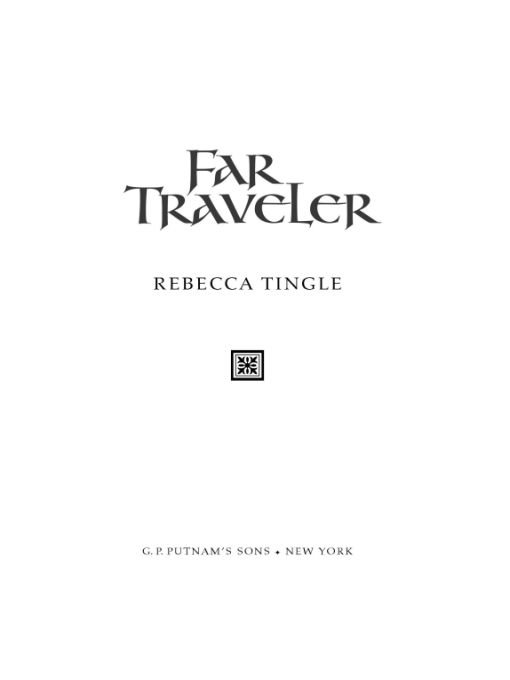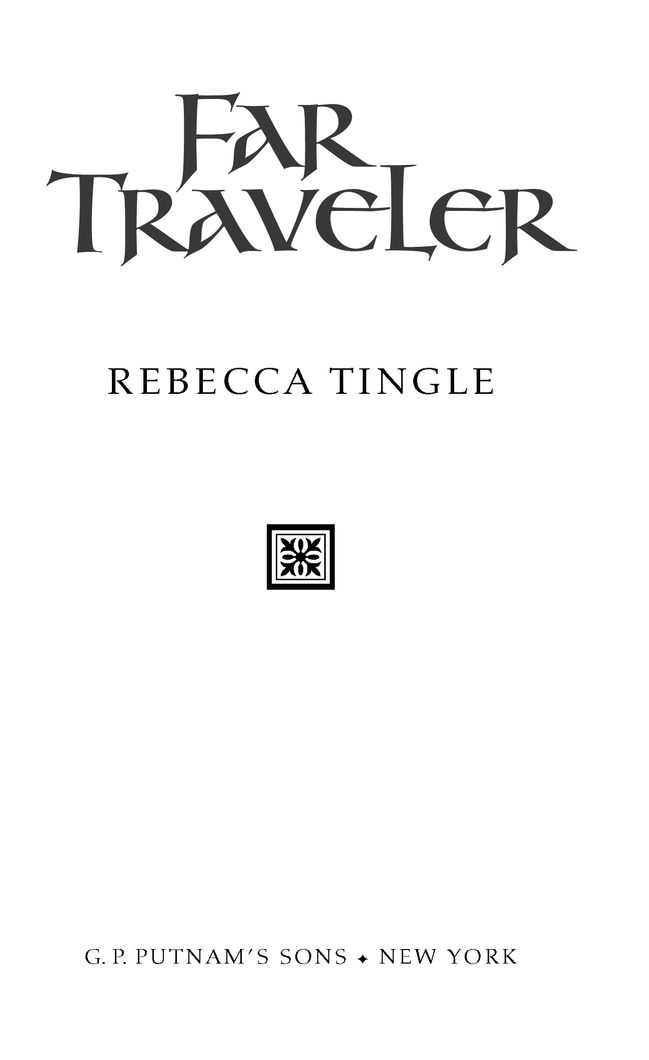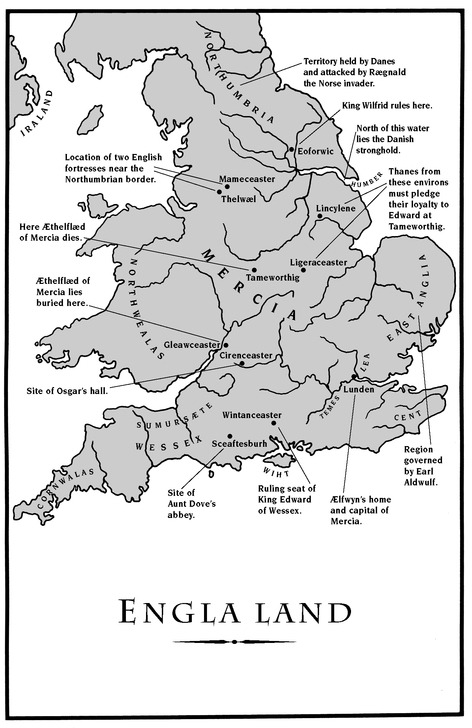Far Traveler
Authors: Rebecca Tingle


Table of Contents
Â
Â
Â
Â

G. P. PUTNAM'S SONS
A division of Penguin Young Readers Group. Published by The Penguin Group.
A division of Penguin Young Readers Group. Published by The Penguin Group.
Â
PENGUIN GROUP (USA) INC., 375 Hudson Street, New York, NY 10014, U.S.A. PENGUIN GROUP (CANADA), 10 Alcorn Avenue, Toronto, Ontario, Canada M4V 3B2 (a division of Pearson Penguin Canada Inc.) PENGUIN BOOKS LTD, 80 Strand, London WC2R 0RL, England. PENGUIN IRELAND, 25 St. Stephen's Green, Dublin 2, Ireland (a division of Penguin Books Ltd.) PENGUIN BOOKS INDIA PVT LTD, 11 Community Centre, Panchsheel Park, New Delhi - 110 017, India. PENGUIN GROUP (NZ), Cnr Airborne and Rosedale Roads, Albany, Auckland, New Zealand (a division of Pearson New Zealand Ltd). PENGUIN BOOKS (SOUTH AFRICA) (PTY) LTD, 24 Sturdee Avenue, Rosebank, Johannesburg 2196, South Africa. PENGUIN BOOKS LTD, Registered Offices: 80 Strand, London WC2R 0RL, England.
Â
Copyright © 2005 by Rebecca TingleeISBN : 978-1-101-49832-3
Map illustration copyright © 2005 by Karen Savary.
All rights reserved. This book, or parts thereof, may not be reproduced in any form without permission in writing from the publisher, G. P. Putnam's Sons, a division of Penguin Young Readers Group, 345 Hudson Street, New York, NY 10014. G. P. Putnam's Sons, Reg. U.S. Pat. & Tm. Off. The scanning, uploading and distribution of this book via the Internet or via any other means without the permission of the publisher is illegal and punishable by law. Please purchase only authorized electronic editions, and do not participate in or encourage electronic piracy of copyrighted materials. Your support of the author's rights is appreciated. Published simultaneously in Canada.
Â
Library of Congress Cataloging-in-Publication Data
First Impression
For Afton and Miranda
with all thanks to Kathy
Seo hæfde moncynnes, mine gefræge,
leohteste hond lofes to wyrcenne.
with all thanks to Kathy
Seo hæfde moncynnes, mine gefræge,
leohteste hond lofes to wyrcenne.
âR. T.
NOTE
SOME OF THE NAMES IN THIS STORY ARE TAKEN FROM OLD English, a version of our language spoken more than a thousand years ago. To make these words look more familiar, I have changed the Old English rune letters wyn (Ï), yogh (δ), and thorn (þ) and eth (ð) into the Roman characters w, g, and th. Another letter called æsc (æ) remains, and indicates the short “a” of our word “cat.” So the first sound in the name “Ãlfwyn” matches the first sound in the better-known name “Alfred.” One more detail of Old English pronunciation: The letters “sc” make the “sh” sound. When you see the word
scop
(which means “bard”), remember to read it as “shop.”
scop
(which means “bard”), remember to read it as “shop.”
Ãlfwyn's story takes place on the shifting battlefield of tenth-century Britain. Danish invaders have seized land north of the Humber River and have settled there among the English people who were there before them. Raiding parties of Danes and rival Norsemen continue to attack English fortresses close to the northern boundary of Anglo-Saxon territory. Mercia, once the largest and strongest of the English kingdoms, has declined and come into the care of Lady Ãthelflæd. She looks to Wessex, where her brother, the West Saxon ruler King Edward, has wealth and men enough to help preserve Mercia's Northumbrian borderâbut this alliance will come with unexpected risks.


RAIN BEAT DOWN, WHIPPING ACROSS THE FACE OF THE SOLI
TARY rider. His horse slipped in the mud of the mountain path, and the man cursed, then bit his tongue. The horse was all he had left, now that his Lord Alric had gone to his grave without an heir.
TARY rider. His horse slipped in the mud of the mountain path, and the man cursed, then bit his tongue. The horse was all he had left, now that his Lord Alric had gone to his grave without an heir.
The man raised a dripping hand to shield his eyes from the rain. Had he seen a light in the dusk ahead of him? Yes, there it was againâa brief glow that vanished. Above the odors of sodden earth and wet horse a new smell reached him: woodsmoke. The man urged his horse forward. There might be a roof for a homeless traveler tonight, after all.
It was a real settlement, he saw as he passed among the sturdy, thatched buildings. In the center of the little burgh stood a tall, fine-timbered hall. One of its large doors opened, spilling light out into the darkness, along with sounds of talk and laughter. Warm food, the rider thought, and drink, and a stable for my horse.
A willing lad took the horse away, and someone showed him a place on a bench and gave him a bowl of rabbit stew. Farmers, the traveler judged, looking around as he chewed, and craftsmen. There were a few men at the far end of the hall who could only be a nobleman's retainers, with their ring mail and leather armor, their battle-scarred faces. Everything here spoke of prosperity, of a lord who had made a good life for his people. The stranger hunched over his supper. He, too, had once known happiness in a good household.
The traveler sighed, and raised his head warily. These people might ask him for his story nowâsmall payment for their kindness. Nevertheless, it seemed hard to tell of his misfortune in the face of such comfort. The hall was quieter now, and as he looked around, the man saw that the people on the benches around him were turning toward the high table. A strong voice was sounding through the hall, hushing conversationâa woman's voice, the stranger realized, and he craned his neck to see who spoke.
She was sitting in the large carved seat, the place of honor, where the lord might sit with his lady beside him. But there was no lord, only a boy child on her lap who leaned his dark head against her shoulder. The lady had balanced a harp in the crook of her arm, and she reached around the child to touch its strings. Inclining her head toward the notes, she began to sing, her mellow voice reaching past the brightness of the hearth to the dimmest corners of the hall, and floating up toward the smoky roof beams. She sang the story of a captured princess, and then told a tale of separated lovers, filling the room with their grief. When that story was finished, the people called for more, and she began the lament of a scop, a storyteller and singer who had lost the favor of his king.
“Who is she?” the stranger asked the man beside him. He'd meant to speak softly, but his voice echoed across the hall, and the lady heard. She looked up, and the visitor hastily ducked, ashamed to have interrupted the performance.
“A newcomer,” the lady said. The man glanced up to find her gazing at him. She wore no noblewoman's circlet, he noticed, only the plaited coils of her light brown hair. But her gown was fine, and she was clearly mistress of this gathering. He cleared his throat.
“My lady,” he said haltingly, “I have not heard a woman who, er, I mean, the scops who played for my lord Alricâ” He stopped, red-faced, unable to turn his clumsy words into a compliment. The lady smiled.
“Be easy here, and rest yourself.” She ran her eyes around the crowd. “Shall I explain why the lady of this burgh does not pass the cup to all her good retainers in noble silence?” The child on her lap laughed, along with many of her listeners, and the man felt an elbow poke him good-naturedly in the ribs. For the first time in many days the lines of worry eased on his face. Someone had filled his cup again, and he took it and drank gratefully.
“Listen! This tale might have happened differently,” the lady was beginning, “if I had learned to ride as well as I learned to read. ...”
I
ÃLFWYN

1
GIFT HORSE
“WE'LL BE LATE!”
“No, we won't. Come on, Ãlfwyn!” My cousin Ãthelstan grabbed my hand and dragged me along after him. We were nearing the stables, and the morning press of riders, servants, and stable hands jostled around us, drowning out Ãthelstan's words.
“But Brother Grimbald is expecting us,” I protested. “Remember what happened last time we missed our Latin lesson?”
Other books
Inside Game: Story 5 of The Wife Games by Arla Coopa
The Funeral Singer by Linda Budzinski
Something Fierce by Carmen Aguirre
Mine Tomorrow by Jackie Braun
Rebellious Daughters by Maria Katsonis And Lee Kofman
The Suicide Project (Rebirth Book 1) by Yazz Ustaris
You Both (Vampire Assassin League Book 29) by Jackie Ivie
A Cowboy for Christmas by Lori Wilde
The Best Man's Guarded Heart by Katrina Cudmore
Private Island: Why Britian Now Belongs to Someone Else by James Meek